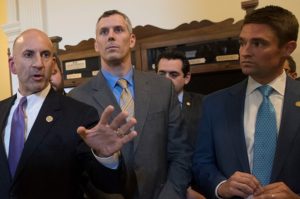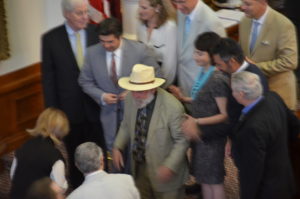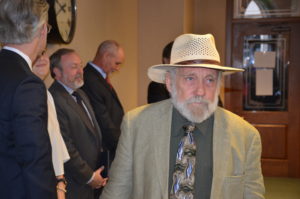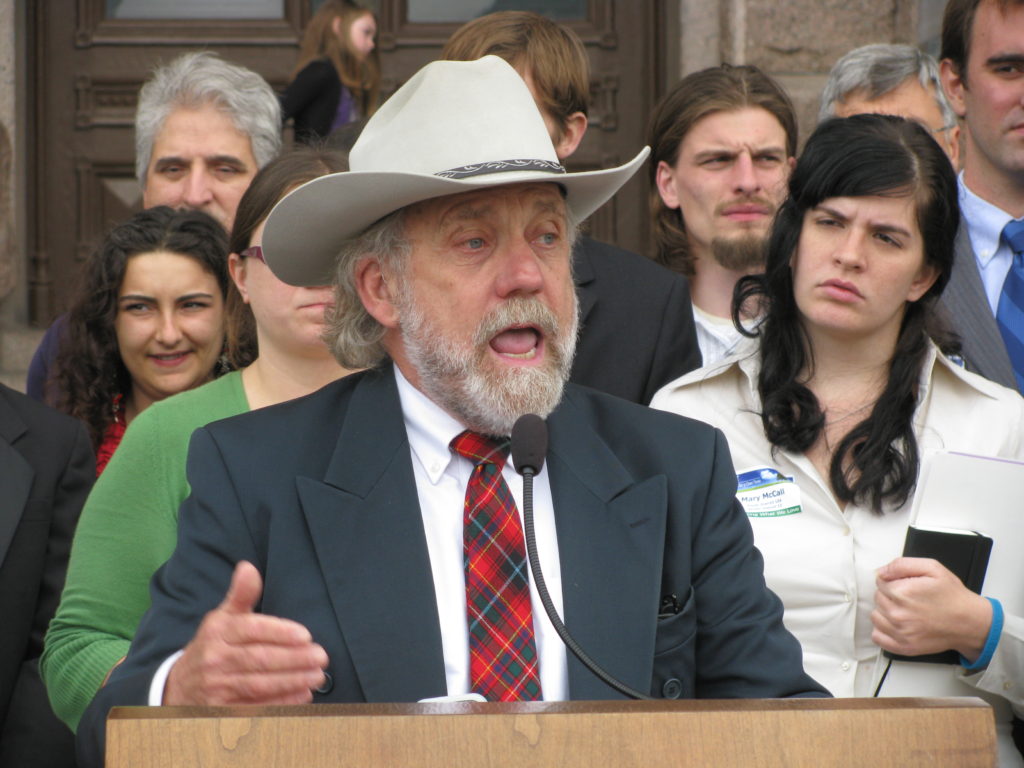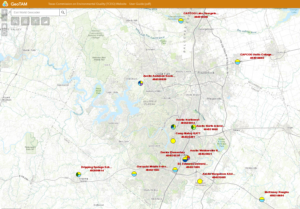
Map of air monitoring sites in Austin. Light blue sites monitor for ozone.
On June 12, Governor Greg Abbott signed a $217 billion budget for Texas into law. Abbott also exercised line-item vetoes to eliminate $120 million from the budget. Among those cuts were $87 million for the Low-Income Vehicle Repair Assistance Program, a voluntary program that helps low-income Texans replace their old, polluting vehicles with newer ones.
Continuing the assault on clean air, Abbott also cut $6 million for air quality planning in certain areas of the state (see pdf p. 5). The governor’s comment on this funding cut is worth quoting in full, beginning with the item vetoed and then the comment in italics:
- Air Quality Planning. Amounts appropriated above include $6,000,500 for the biennium out of the Clean Air Account No. 151 in Strategy A.1.1, Air Quality Assessment and Planning, for air quality planning activities to reduce ozone in areas not designated as nonattainment areas during the 2016 17 biennium and as approved by the Texas Commission on Environmental Quality (TCEQ). These areas may include Waco, El Paso, Beaumont, Austin, Corpus Christi, Granbury, Killeen Temple, Longview Tyler Marshall, San Antonio, and Victoria. These activities may be carried out through interlocal agreements and may include: identifying, inventorying, and monitoring of pollution levels; modeling pollution levels; and the identification, quantification, implementation of appropriate locally enforceable pollution reduction controls; and the submission of work plans to be submitted to the TCEQ. The TCEQ shall allocate $350,000 to each area and the remaining funds to each area based on population in excess of 350,000. The grant recipients shall channel the funds to those projects most useful for the State Implementation Plan (SIP).
This program funds, among other items, bicycle use programs, carpooling awareness, environmental awareness campaigns, and locally enforceable pollution reduction programs in near non-attainment areas, which can be funded at the local government level. Resources in the Clean Air Account should be prioritized to directly address problems in our non-attainment areas of the state so that we are better positioned to combat the business-stifling regulations imposed on these areas by the Environmental Protection Agency. I therefore object to and disapprove of this appropriation.
This is an unfortunate description of air quality planning activities and of the purpose of the Clean Air Account itself. So what are “air quality planning activities to reduce ozone in areas not designated as nonattainment areas”?
Ozone is a harmful pollutant that is linked to everything from asthma attacks and difficulty breathing to heart attacks, stroke, and premature death. Ozone is formed in the atmosphere through the mixing of other pollutants that are emitted by vehicles and industrial sources such as refineries. There are two areas of the state—Houston, and Dallas—that do not meet the federal air pollution standards for ozone. These are our “nonattainment” areas. There are many other areas in the state—including San Antonio and Austin—that do meet the federal ozone standard but still have numerous bad ozone days throughout the year. These areas, especially San Antonio, risk worsening air quality and an eventual “nonattainment designation” by the Environmental Protection Agency. Such a designation would subject the area to decades of regulation and costs that could reach the billions.
All of us have seen the ozone action day announcements. Those alert at-risk citizens (like children, the elderly and those who have certain health risks) to curtail their outside exposure to mitigate the negative health impacts. Local air quality monitors are what alert us to those dangers.
In order to keep the “near-nonattainment” areas clean and healthy (and to avoid the federal designation), Texas appropriates several million dollars for air quality planning activities. This money enables these areas to participate in programs like the ozone Early Action Compact. So far, these programs have been successful, though San Antonio may inevitably face a nonattainment designation as it grows.
Surely Governor Abbott understands the importance and success of these air quality planning activities. Describing the program as consisting of “bicycle use programs, carpooling awareness, environmental awareness campaigns, and locally enforceable pollution reduction programs” is an obvious straw man. Bicycle and carpooling programs—while important in their own right—are not all that goes into air quality planning.
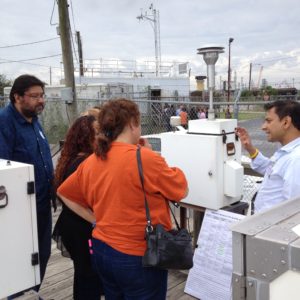
Air quality planners in Houston demonstrate how that city’s air monitors operate.
In Austin, for example, the city maintains eight ozone monitors in addition to the two maintained by the Texas Commission on Environmental Quality (TCEQ). These additional monitors help with air quality forecasting. They also help us to better understand large-scale impacts on air quality to our region by sources such as the Fayette power plant to the southeast, or Dallas to the north.
San Antonio just announced that it will shut down six ozone air monitors and lay off four staff members in response to the governor’s cuts. This is truly unfortunate for the people affected and for air quality monitoring and pollution prevention. If data is never collected, the ability to paint long-term pictures and identify trends in air pollution is lost for that time period. San Antonio may one day refund its program, but its former employees will have moved on, and the data will have been lost forever.
On the same day, San Antonio made this announcement, the Central Texas Clean Air Coalition in Austin held an emergency meeting to discuss how it would respond to the proposed funding cuts. The Capital Area Council of Governments (CAPCOG) has asked its member counties and cities to consider an additional financial contribution to support ongoing air quality planning activities in Austin. CAPCOG proposed tiered levels of funding that would alternatively fund more or less the region’s activities.
At the meeting, CAPCOG members seemed to understand the importance of a funding level that would keep all staff in place and all air monitors active. Cuts will definitely have to be made (to, for example, the regular maintenance schedule for those monitors) but if CAPCOG’s members do approve the appropriate tier of funding, then air quality planning programs in Austin will remain largely intact.
We hope that Austin is able to continue its important work by keeping Austinites safe from dangerous ozone pollution. Governor Greg Abbott may not recognize the importance of this work right now, but we hope that he does some day and that these shortsighted cuts do not continue.
Read Full Post »





